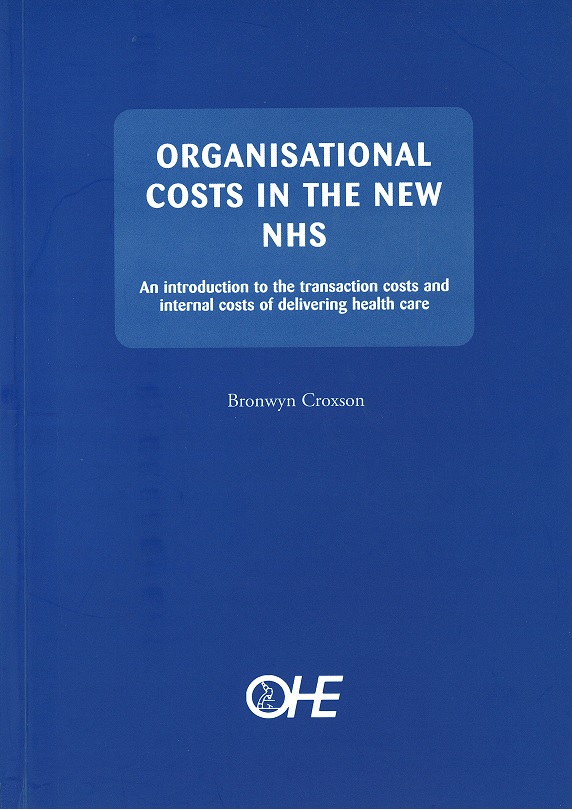Sign up to our newsletter Subscribe
Challenges and Solutions for Budget Impact Analysis of Gene Therapies

There is widespread criticism of organisational costs in the NHS. ‘Reduce bureaucracy, release funds for patient care’ has become a popular slogan. This so-called ‘bureaucracy’ may, however, be essential to delivering health care. The complexity of modern health care means that some organisational…
There is widespread criticism of organisational costs in the NHS. ‘Reduce bureaucracy, release funds for patient care’ has become a popular slogan. This so-called ‘bureaucracy’ may, however, be essential to delivering health care. The complexity of modern health care means that some organisational costs have to be incurred if the right health care is to go to the right people at the right time. We do not have a comprehensive estimate of organisational costs in the N H S , but their significance is indicated by the sum of £ l , 2 2 5m spent on managers by English NHS trusts in 1996/97 (about 5 per cent of their total income). This figure is consistent with the US Health Care Finance Administration’s estimate that in 1991 $43.9bn was spent on administration in the US, almost 6 per cent of total expenditure. Understanding these costs, within a rigorous framework, is vital to the efficient allocation of health care resources because these estimates are not on their own useful. They do not tell us whether the costs were necessary to deliver health care, nor do they tell us whether they were costs incurred in ensuring that local health services met the needs of local populations. So-called ‘bureaucracy’ may be an end in itself, and is now commonly used as a pejorative term to suggest that it is. However, it may also comprise expenditure necessary to co-ordinate the different people who deliver increasingly complex health care, or the costs incurred in making sure that the right health care is delivered to the right people at the right time. Terms like ‘bureaucracy’, ‘management costs’, ‘administration’, ‘red tape’ and ‘transaction costs’ are used interchangeably by most commentators. Yet they may refer to activities making very different contributions to patient care.
The issue of organisational costs has been pushed to the fore of health care policy making in the UK, particularly by claims that such costs rose following the introduction of the N H S internal market in 1990. The Conservative government introduced a number of initiatives to reduce these costs in the internal market, and now the belief that ‘bureaucracy’ is too high in the N H S underlies a series of White Papers, which outline measures supposed to generate a £1b in ‘bureaucracy’ during the current Labour government’s term.
There is, however, little rigorous evidence about relative levels of organisational costs in the NHS, before and after 1990. It is certainly the case that we would expect the type of organisational costs incurred to change, because the internal market introduced contractual relationships into the NHS. The costs accompanying contractual relationships, transaction costs, are likely to be qualitatively different from those incurred under the pre-1990 system, internal costs, since the problems relating to uncertainty and conflict differ in the two systems. We do not, however, know that this change in type was a bad thing, since we do not have convincing evidence that the overall level of organisational costs increased in the internal market or that there were no offsetting efficiency gains elsewhere.
This monograph presents a framework that can be used to conduct the type of rigorous analysis necessary to analyse changes in the costs of organising health care. As argued above, an increase in resources devoted to organisation and management may be a good thing. Alternatively, an increase in organisational costs may not improve patient welfare. There may be waste and unnecessary expenditure in organisation and management, as in any activity. A change in organisational costs must, therefore, be subject to the same rational analysis as a change in any activity. The monograph has been written for people working in health care, with an interest in economics but not necessarily with any formal training in the area. It begins in section 2 with a brief description of the structure of the NHS internal market. Section 3 outlines an economic framework which can be used as the basis of rigorous analysis of organisational costs, illustrated with a case study of contracting for orthopaedic services. Section 4 discusses the 1997/98 White Papers which outline reforms to the NHS in England, Wales, Scotland and Northern Ireland. This section analyses the measures outlined in these papers supposed to reduce organisational costs and concludes that many of the measures will be ineffective as well generating new organisational costs not recognised in the White Papers. Section 5 concludes with a brief discussion of the issues raised.
Organisational Costs in the New NHS
Croxson, B.
(1999) Organisational Costs in the New NHS. OHE Monograph. Available from https://www.ohe.org/publications/organisational-costs-new-nhs/